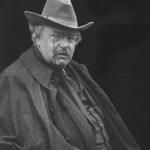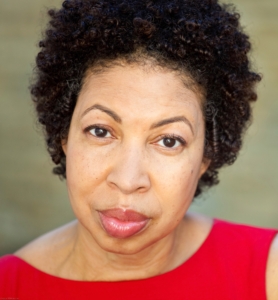On Apples, Walnuts, and G. K. Chesterton
This month I am struggling with my writing. I may be falling into the trap of trying to write “well.” In my desire to improve my work, I leave the world of honest reflection and search for beautifully descriptive language instead, trying, perhaps too hard, to be good at it.
I recently discovered the English author G.K. Chesterton (1874-1936) in Phillip Lopate’s anthology, The Art of the Personal Essay. Chesterton wrote at least ninety books. So far I’ve read only a few of his essays. At first, I thoroughly disliked Chesterton, thinking him a wordsmith with nothing really meaningful to say—that is, to me. To open “A Piece of Chalk,” he writes:
I remember one splendid morning, all blue and silver, in the summer holidays, when I reluctantly tore myself away from the task of doing nothing in particular, and put on a hat of some sort and picked up a walking-stick, and put six very bright-coloured chalks in my pocket. I then went into the kitchen… and asked the owner and occupant of the kitchen if she had any brown paper.
Chesterton continues the passage:
She seemed to have an idea that if a person wanted brown paper, he must be wanting to tie up parcels; which was the last thing I wanted to do; indeed, it is a thing which I found to be beyond my mental capacity.

G.K. Chesterton
Here, Chesterton gives the impression that, though he is clearly a man of education and ability (as his writing illustrates), he couldn’t possibly know how to tie up his own parcels, as if there was always someone else to do those sorts of things for him. I inferred that Chesterton’s audience were people like himself, those who casually depend on a servant class. I took an immediate dislike to Chesterton.
I forced myself to keep reading, and I found Chesterton’s work to be steeped in deep moral conviction and social observation. Not easy for me to miss, while continuing to read “A Piece of Chalk,” in which he further writes: “In a word, God paints in many colours; but He never paints so gorgeously, I had almost said so gaudily, as when He paints in white.”
“Okay,” I said to myself, “I’m done. Is this guy for real?”
But the man was not so easily dismissed. He really knew his way around language. I Googled him and found The American Chesterton Society, a website dedicated to the writer’s prolific body of work. There I discovered that Chesterton wrote some 4000 essays (that’s an essay a day for eleven years), and that he is still thought to be one of the greatest writers of the 20th century. Perhaps I had something to learn.
* * *
My own memoir is in a woodsy place. I’m finding it difficult to decide on structure, on a particular form. Put more plainly, I am lost in the woods and afraid I have no idea what I’m doing.
Frustration led me to take a break from my book: to eat, to read, and to write something different. I’m experimenting with walnuts, apples, reading G.K. Chesterton (among others), and writing lyric essay. I realize that I’m looking for a clear definition of lyrical prose.
The lyrical shares something with poetry, an emotional intensity. Lyricism allows the writer to draw beauty from the mundane. Is this why I am so intrigued by Chesterton’s writing: his ability to create art out of the ordinary? In “On Running After One’s Hat” he writes,
I feel an almost savage envy on hearing that London has been flooded in my absence…. My own Battersea has been, I understand, particularly favored as a meeting of the waters. Battersea was already… the most beautiful of human localities. Now that it has the additional splendor of great sheets of water, there must be something quite incomparable in the landscape (or waterscape) of my romantic town.
* * *
There is something to be relished in word play, and the practice of writing is the only thing that improves one’s writing, so I choose an ordinary subject—walnuts and apples—and I attempt to write like Chesterton. Having lost my way in my memoir, with little understanding of a path forward, I try my hand at another style, hoping it will prove less unwieldy and perhaps inspire a tightening of structure and a use of the poetic:
I prefer raw walnuts to raw almonds with my apples. It’s odd. Almonds are my very favorite nut and apples my least favorite fruit, preferring them mainly in pies. But walnuts and apples in combination have become a simple and satisfying pleasure. I discovered the preference purely by accident. Passing over almonds one day in my fancy supermarket (something about excessive use of water in the growing of almonds), I instead chose walnuts.
I’m not sure I’ve been successful. My experiment with nuts and fruits is not very poetic. Perhaps Chesterton is not the appropriate writer for me to emulate. An Englishman who wrote one hundred years ago and I have nothing at all in common. There are many contemporary geniuses to choose from. Still, I continue my Chesterton exercise:
Yes, I shop in fancy supermarkets. It is one of the ways I convince myself I am firmly part of the middle class. I shop for food where the rich shop for food. Places my father would have felt uncomfortable entering and, I imagine, would now be rolling over in his grave had he any inkling of what I spend on organically grown tree nuts and grass fed beef.
Though I attempt to mimic Chesterton’s lyrical and descriptive lightness of place and circumstance, I find myself moving almost immediately toward a darker worldview, and continue to wonder if Chesterton is the appropriate artist to take on as an example. For though his mastery of craft is clear, it’s the tone of his work (as least what I’ve read so far) that causes the gulf I’m not sure I can cross.
* * *
Lost in the woods, I’m overwhelmed by all of the rocky outcrops, pebbles and streams, flower patches and woodland creatures populating my nascent memoir. The butterflies, spiders, chipmunks, eagles, and wasps (lots of wasps) are currently too numerous to coherently organize.

Sumner Housing Projects
It’s an urban landscape, these woods where I find myself lost. Cement sidewalks, rooftops, streetlamps, elevated subway platforms, tiny housing project elevators, incinerator shoots, gates on windows, urine in stairwells, vomit, chain link around grassy lawns, monkey bars and sliding boards and swings in playgrounds on housing project grounds, our own playgrounds so that we don’t invade the other playgrounds. Stay put, stay to yourself in a deceptively integrated, no, deceptively segregated northeastern industrialized city environment. Flagpoles and roller-skates, hopscotch, skelly with bottle tops and chalk. Police car sirens, rattling trains on elevated tracks outside a child’s bedroom window, car horns, Spanish boleros, shouting family fights, the occasional scream, storefront church organs and tambourines, midnight silence interrupted by city buses pulling into empty stops opening and closing their doors. Mommy humming, Daddy whistling, children singing ring around the rosie and miss mary mac mac mac.
And trauma. Lyricism is that ability to explore interiority, the landscape of the mind where trauma rests, waiting, lurking in corners, baiting the artist to show and tell. “Can you do it? Ha! I’d like to see you try.”
How do you write lyrically about trauma? There is the truth. But does writing the truth make the language sing? Does writing lyrically about trauma somehow diminish the trauma or does it illuminate the trauma? What does lyricism do to the truth? Is this what’s stopping me: the fear of exploring specific memories through language, or is it simply the necessary task ahead—the down and dirty work of telling the truth?
I’ve read memoir where the narrator manages to tell her story in all of its tragic and redemptive detail. It is one thing to read another’s courage on the page. It’s another thing to find your own.
Chesterton’s brilliance lays not only in his masterly use of language but also in his ability to land scathing social criticism while maintaining good humor.
Perhaps, my memoir is unwieldy because I’m attempting to blend lyricism and social criticism and have not quite figured out how.
Chesterton’s writing reveals a man at ease in his world and magnanimous in his optimism and faith.
I’m far less at ease in the world and sometimes struggle with both faith and optimism. We do, however, share a love for language and it’s the devotion to words and language that connects writers across divides of space, time, and culture. Will it require 4000 essays to master my craft? Perhaps. In the meantime, I’ll continue to find inspiration in the work of the Chestertons of the world, along with artists who’ve lived beyond his century-old point of view.
Angela Bullock is an actor/writer pursuing an MFA in Creative Nonfiction at Antioch University LA.






